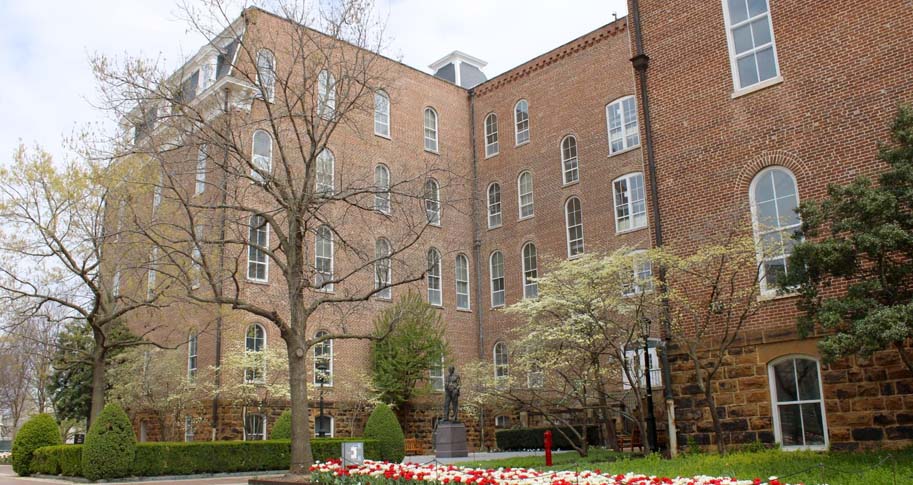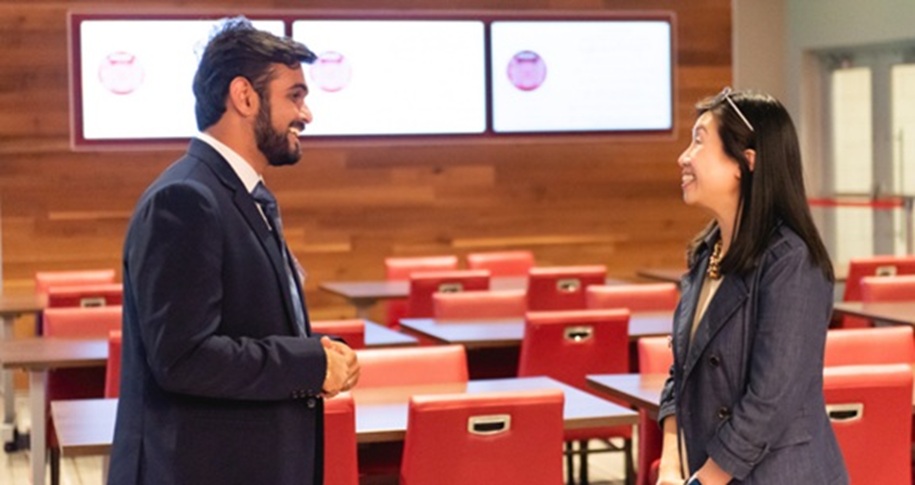
The Walton College provides a unique mentoring program where the full-time MBA students are paired with top level corporate executives from all over Northwest Arkansas.
The Walton College strives to provide meaningful learning opportunities for its students. The MBA Mentoring Program, a two-year long program for full-time MBA students, is a prime example of Walton College’s dedication to student success and growth.
In the program, students are assigned a mentor who is a local top-level executive so the student to learn and grow from their experience and knowledge. The program provides students with a unique learning experience that is outside the traditional classroom. Students build their connections and networks in the industry, while the mentor learns new perspectives from students.
The program incorporates formal and informal paring. Formal paring is centered around paring students and mentors who share similarities and pair with each other intentionally. Formal pairing usually allows the student and mentor to build stronger connections and bonds. Their topics are planned and structured, allowing the pair to dive deeper in conversations and meetings. The pairs planned topics can range from normal conversation to more focused discussions on topics such as utilizing LinkedIn, elevator pitches, gaining confidence in their field and overall advice from the mentor. Formal pairing can also be considered as one hour of professional development.
Informal pairing utilizes a random assignment of mentors and mentees with casual, less structured conversations. At the end of the semester, mentors and mentees submit a report on what they learned from their experience.
In the program, executives and students have specific roles to help ensure the program reaches its potential and remains in an overall professional manner. The role of the mentee is to take the lead in maintaining the mentor relationship, maintain meeting attendance, take feedback in a respectful manner, and be able to discuss uncomfortable topics like failures and fears in career fields. The most important role for the mentee is to not ask the mentor for a job and to maintain confidentiality about the vulnerability that is shared.
The role of the mentor is to establish trust with the mentee and to provide honest yet sincere feedback and oversight. The mentor should commit to meet with the mentee on a regular basis and maintain confidentially on the what the mentee shares with the mentor. The most important role for the mentor is to show the mentee that they care about the mentee’s experience and to mentor with full effort and provide resources that are beneficial to the mentee.
Overall, the MBA Mentor Program allows for growth, development and the ability to make long lasting relationships.
One full-time MBA student shares her feedback about the mentoring program:
- What is the most valuable part of a mentor/mentee relationship?
- How do you prepare for your mentorship meetings?
- What specific skills, development or experience are you hoping to gain from the relationship?
- What is the best advice you have been given by a mentor?
- What does success look like in a mentor/mentee relationship? Why does mentoring matter?
“Having a mentor allowed me to ask the ’embarrassing’ questions to someone who has
‘been there, done that.’ It gave me a space to be vulnerable with my concerns transitioning
from college to corporate life. There are so many topics that can’t be taught through
a lecture or textbook, so having my mentor there to have these conversations was crucial
to my development as a young professional.”
“Before meetings, we would have topics in mind to discuss. Themes included women in the workforce, negotiations, work life balance, etc. We would also touch base on how interviews and job hunting was going, her own promotions and career changes, and give advice and praise for our accomplishments. If I had an interview coming up, she was always happy to role play and review my resume.”
“This relationship has taught me many skills, but the predominate value was that this relationship gave me someone relatable to look up to and try to emulate. Having a young successful woman to talk with bolstered my success. Because we had the time to get to know each other well, she was able to recommend books, podcasts, etc. that fit my needs specifically. She helped fill the gaps that school does not fill. She gave great advice on how to approach a raise/promotion discussion, negotiations, workplace tensions, female/male work differences, etc.”
“When preparing interviews, she helped me prepare by performing multiple mock interviews with me. During the process, she remarked, ‘You are underselling yourself. Now is not the time to be humble. If there was ever a time to boast about your accomplishments and resume, now is the time to do it, even if it feels uncomfortable.’ Needless to say, I got the position. Thank you, Jane!”
“I believe success looks different for each relationship. It depends on many input variables and desired objectives. While the relationship may seem one-sided at first, I believe that as the relationship develops, it becomes symbiotic. It allows the mentor time to reflect on their own experiences and evaluate their past approaches. The relationship is thought provoking for both parties, and as with any relationship, helps build a solid network.”





